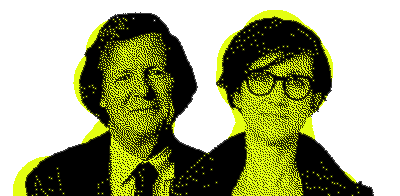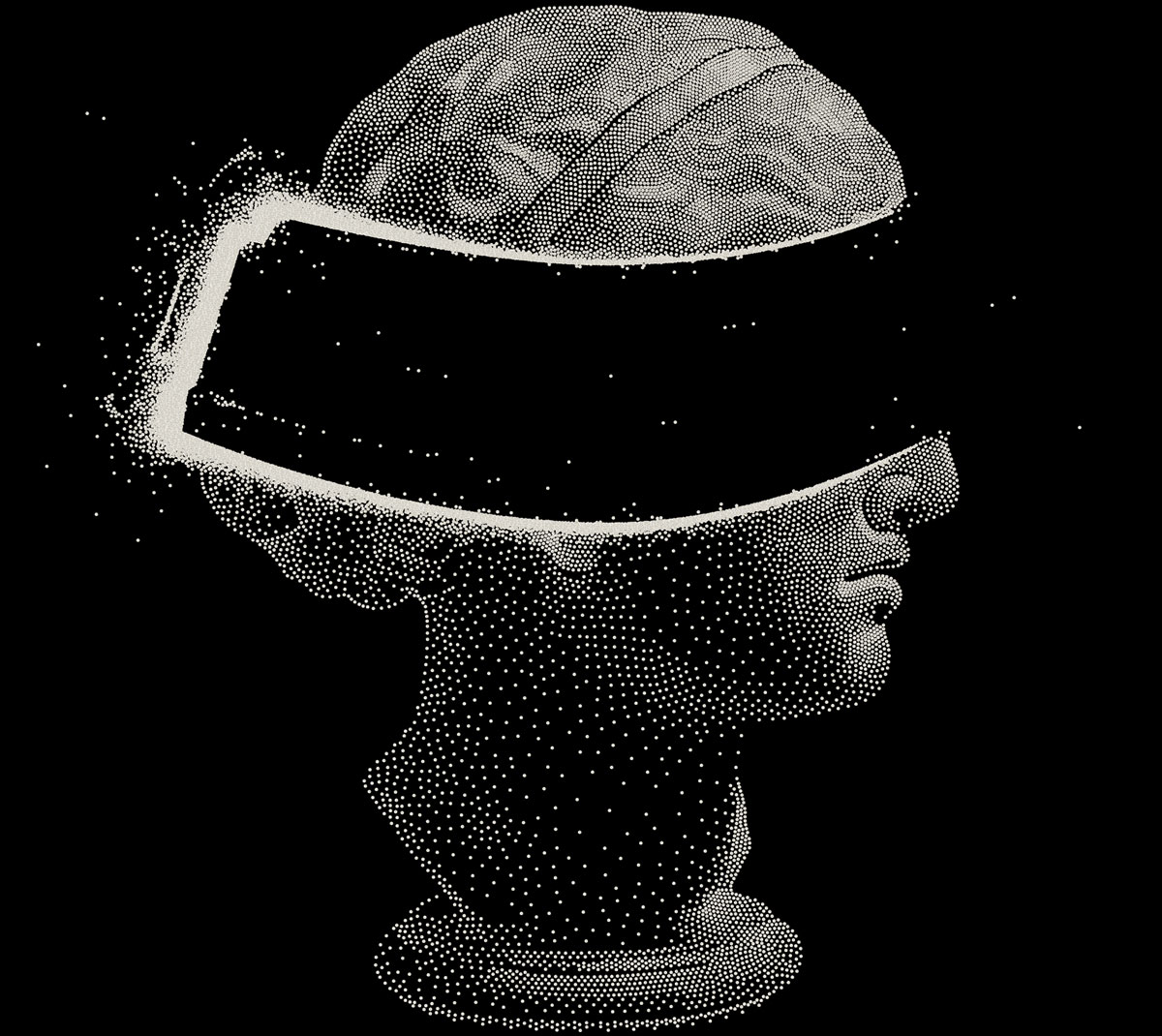Is There
Hope for the
Institutions
that Have Failed Us?
With the public’s faith in organizations at historic lows around the world, women may hold the key to rebuilding that trust.

Illustration by Jules Julien
Something wasn’t right.
It was 2014, and 37-year-old LeeAnne Walters was losing her eyelashes. Her four children were suffering skin rashes, stomach pains, and dizziness. Walters, a trained medical assistant, suspected that the brown-tinged water coming from the tap in her Flint, Michigan, home was to blame, but doctors attributed her family’s ailments to contact dermatitis, eczema, and scabies. The city claimed the hue was merely the result of winterization efforts. “The city water is safe to drink,” Flint’s mayor at the time said at a press conference. “My family and I drink it and use it every day.”
Unconvinced, Walters persuaded authorities to conduct a test of her household’s water, which showed lead levels seven times the Environmental Protection Agency's threshold. In a second test two weeks later, levels had spiked to 27 times the threshold. A round of testing on Walters’s children revealed lead exposure in all of them, and one of her young sons had full-on lead poisoning. Walters threw herself into the case, ultimately discovering that the city was not applying the proper control standards to its pipes. Walters contacted an EPA official and, later, the American Civil Liberties Union (ACLU). The resulting investigation sparked nationwide alarm about this public-health crisis—and about the rampant governmental failures and cover-ups along the chain of command. People wondered, How could this have happened, in our own backyards?
on Netflix's CollateralCollateral explores the spiraling repercussions of the fatal shooting of a pizza-delivery man in London. Refusing to accept this as a random act of violence, Detective Inspector Kip Glaspie (Carey Mulligan) discovers a darker truth. This modern-day state-of-the-nation explores several connected stories, raising questions about nationalism, immigration, and larger institutional failures. Now streaming on Netflix. Find out more
The blight of corruption in modern institutions is endemic, and as a result, our belief in those institutions is on the verge of collapse. According to a Pew Research poll, only 18 percent of Americans trust the government in Washington, D.C., to do what is right—a figure that has dwindled from 73 percent in the late 1950s, as historic events like the Vietnam War, Watergate, and worsening economic crises have chipped away at the public's trust. And misconduct is hardly limited to those whom we elect to protect us. Fraud, nepotism, bribery, and graft have eroded the public’s trust in once-dominant institutions like religion, news media, banks, and even public schools. The health-care sector is rife with corruption: Drug companies peddle medications with dubious effects and apply unconscionable prices to life-saving medications. We laud the bravery of the female gymnasts who testified against their abusive doctor, yet the sport’s governing body failed to do anything while he reportedly molested as many as 265 girls over 20 years. Several FBI officials knew about the doctor’s supposed “treatments” for a year but failed to take action.
We laud the bravery of the female gymnasts who testified against their abusive doctor, yet the sport’s governing body failed to do anything.
Research from the United Nations Development Programme (UNDP) indicates that institutional failure disproportionately hurts women. This manifests in a number of ways, usually resulting in women receiving inadequate support from schools, hospitals, and government agencies. Often the main family caretakers, women are therefore more likely to encounter corrupt public services. When they do, they are more vulnerable to sexual extortion in exchange for services like medical care and access to water. If the pervasiveness of sexual extortion wasn’t already apparent, the explosion of the #MeToo movement has revealed sexual harassment and discrimination to be par for the course across industries and borders.
And yet—or perhaps because of this—women are leading the charge in rooting out corruption in modern-day society. After all, two relentless female reporters broke the sexual abuse story that set #MeToo in motion, not to mention the legions of women who came forward with additional allegations. From Flint’s undeterred “water warrior” to a network of female whistle-blowers and the young woman speaking out against the undue influence of the gun lobby, a real-life justice league of indomitable women is forming to hold our authorities accountable.
Click to Read the interview

Q&A with the Writer and Director of Collateral
David Hare and S.J. Clarkson
David, you’ve been writing about political and social issues for a long time. What inspired you to write this particular story, and why right now?
David Hare The 21st century is going to be marked by the mass movement of people trying to escape war and persecution and poverty. And I think this is only the beginning. Very few people are writing about this in fiction. But clearly the question of how the haves are going to behave toward the have-nots is the great question of [our time].
The series takes on the relationship between individuals and institutions. What do you think is happening to that relationship in the world right now?
David HareWe have this very ambiguous attitude toward whistleblowers. We love people who fight institutions that are not our own. And yet, when there are whistleblowers within our own institutions, they’re being terribly disloyal. Institutions seem to be getting tighter and tighter in the way they command people behave so it’s not surprising that so many people feel they have very little freedom of movement within institutions. And so I present everybody in the series as having a dilemma about whether to go along with the rules or whether to break the rules. And some people break the rules successfully, some break them unsuccessfully.
It feels like we’re awash in news about corruption these days. Do you think we’re becoming desensitized to corruption?
David HareNo. I think human beings are moral in the way they’ve always been moral. They know when they’re doing wrong. But I think people are very sophisticated now about idealism and pragmatism. Most drama distresses me its extreme moral simplicity. But in this series, there are neither good people nor bad people. There are just people trying to do their best. The most common reaction from people who have seen all four episodes is how bewildering it is to find themselves so sympathetic to the killer!
S.J. ClarksonWe worked hard at that, I have to say.
These are some pretty heavy themes. How do you tell this story without coming off as heavy-handed or didactic?
S.J. ClarksonDavid spent a lot of time with police and talked about their almost macabre sense of humor, and the fact that they have to have that. It was about mining those moments of levity, and making it very real. What we never wanted to do was “play the moment,” or say, “This is what you should be feeling, so let’s play that and make you feel it.”
David HareI can’t stand what I call “Sixth Form Essay Writing.” When you get a sort of dramatized sociological essay, it’s just a nightmare. What I’m always trying to do is to tell stories that reflect what’s going on, not write a flaming thesis about it.
The series features so many characters with intersecting relationships and storylines. How did you work with that kind of script?
S.J. ClarksonEven though Kip Glaspie [a detective played by Carey Mulligan] is the central pivot of the story, each of the other characters becomes bigger in their own way. I tried to make sure that each of them felt nuanced and believable. That was the genius of revealing the killer early on, because then it wasn’t a whodunnit but a whydunnit, meaning we could actually understand that character as opposed to just figuring out who the killer is.
David HareWe say that lovers of Agatha Christie are going to be very disappointed with the series.
There’s a line in which Kip Glaspie says, “It all comes down to people.” What did you mean by that?
David HareI was brought up in left-wing politics but I could never be a Marxist because they believed there was only the system. I believe individuals make a huge difference in history. That faith remains with me, and that’s clearly what Kip Glaspie believes. She’s saying, “If within the system you happen to be lucky enough to run into somebody you can trust—give them your trust.” To me, that’s what being a human being is about.
Photos by Walter van Dyk (David Hare), WENN ltd/Alamy (S.J. Clarkson)
So often, when institutional misdeeds do come to light, it is a woman who is tasked with cleaning up internal culture and restoring the public’s faith in a disgraced institution: When a corruption scandal rocked Honolulu’s police department last fall, Major Susan Ballard was promoted to department chief; when sexual harassment scandals brought down veteran male television hosts, networks turned to their female counterparts to take over. Fed up with the blatant misbehavior of so many male politicians—including those in the highest office—record numbers of women are taking matters into their own hands by running for Congress in 2018.
A woman in charge sends a reassuring message to the public, but the limited research that exists on the topic supports the notion that women’s role in combating corruption goes far beyond good PR. “Gender and Corruption,” a 2000 report conducted by four economists, shows that women are less involved in bribery and less likely to condone bribe-taking. (Just ask the bribe-resisting female traffic cops that Peru has enlisted to combat unfettered crime in its streets.) Furthermore, the report’s authors found, corruption is less severe in governments in which women hold a larger share of parliamentary seats and senior positions in government bureaucracy. Meanwhile, a World Bank study showed that “one standard deviation increase in [female participation in government] will result in a decline in corruption…of 20 percent of a standard deviation.”

Illustration by Jules Julien
The suggestion that gender predisposes women to be less corrupt than men is very much up for debate, but women do appear to be less tolerant of corruption. Why are men more likely to cave to their worst impulses and profit at the expense of others? For starters, men hold far more positions of authority, so the numbers skew due to simple opportunism. “It is not a secret that men tend to have more social and economic power than women,” says Marina Zaloznaya, an assistant professor of sociology at the University of Iowa, whose work focuses on the mechanisms of corruption. “As a result, it is easier for men to get out of legal and administrative troubles and also easier to perpetrate and to hide offenses.” But even women who reach a certain institutional echelon are often excluded from the “old boys’ network” or are relegated to bookkeeping roles—which places them in prime positions to blow the whistle on morally questionable practices.
But many women, perhaps the majority, are in no position to speak up. Marwa Fatafta, a Middle East and North Africa regional advisor at Transparency International, says that “sextortion”—the all-too pervasive practice of a person in power forcing somebody with less power to engage in sexual acts—is especially prevalent in the regions on which she focuses. “It’s teachers asking for sexual favors in exchange for a better grade; it can happen at border control or in encounters with law enforcement such as policemen or judges,” she explains. Illegal migrants and refugees are especially vulnerable, she adds, as they lack any form of recourse.
Long before her tenure at the University of Iowa, 33-year-old Zaloznaya grew up in Crimea, a society awash in small-scale corruption. When she moved to the U.S. for college, Zaloznaya says, she “was struck by the fact that everyone was following the rules and earning their grades legitimately.” Zaloznaya’s research shows that people are not innately corrupt; it’s an environmental affliction. In other words, people will break the rules when they think they can get away with it. In a study of more than 4,000 people in Russia, Ukraine, and Georgia, Zaloznaya and two collaborators found that ordinary people are likely to give bribes to doctors or university instructors when they believe that bribery is acceptable and that the risks of such behavior are low. Not surprisingly, she has found that individuals are significantly less likely to engage in corruption at organizations that encourage transparency and accountability. The ubiquity of malfeasance suggests that the latter are few and far between.

2017 marked the largest-ever drop in public trust across all four of the key institutions surveyed: business, media, government, and NGOs.
53 percent of respondents believe that the current overall system has failed them.
2017 Edelman Trust Barometer online survey
How did we reach this era in which foul play is the unpleasant but accepted standard? According to Sarah Chayes, an anti-corruption crusader who has waged her fight from the Middle East to the U.S., the culture of corruption is highly contagious and has spread from undemocratic nations to ostensibly enlightened ones. As a reporter for NPR who covered the Kosovo War and the fall of the Taliban in Afghanistan, Chayes was unsatisfied with merely describing other people’s misfortunes. Instead, she started working at an NGO run by the brother of the then-newly elected President Hamid Karzai of Afghanistan, whom Chayes and many others viewed as a bastion of hope for a new era. But Chayes’s hopes were soon dashed: She observed the family as it pocketed workers’ salaries and raised aid money for a so-called affordable housing project that was in fact a gated community engineered for personal profit. “It was incredibly heartbreaking,” she recalls.
Disillusioned, Chayes returned to the U.S. to work as a special adviser to Admiral Mike Mullen, then the chairman of the Joint Chiefs of Staff, helping to craft policy for Afghanistan, Pakistan, and the Arab Spring. She hoped to make government agencies see that in order to quash the growing extremism in Afghanistan and in the surrounding areas, they first needed to extinguish institutional corruption in those regions. Her message fell on deaf ears at the Pentagon, where her colleagues were more interested in singling out insurgents than addressing the broken state that gave them cause. Again, Chayes resigned and found another way to spread her message by publishing Thieves of State, a book laying out her theory: When societies tolerate foul play in their chambers of power, economies go bust, societies lose morale, and insurgencies balloon.
Understanding the caustic, intractable, and viral potency of corruption, Chayes believes, helps explain our society's volatile condition: torn apart by a global refugee crisis, economic instability, bitter politics, and divisive nationalism. There are myriad forces at play, but women, in their singular position as both victims of and crusaders against corruption, offer a sliver of hope. “It’s the most important challenge in our generation,” Chayes says. “That’s why I’m in it 100 percent.”
